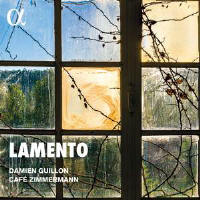Texte paru dans: / Appeared in: |
|
|
Outil de traduction ~ (Très approximatif) |
|
|
Reviewer: Raymond
Tuttle
We hear complaints all the
time about the dearth of singers, in these days, who can do justice to
Puccini and Verdi. Do these complainers realize that we are living in a new
golden age of countertenors? Not a month goes by, it seems, without a new
one coming to the fore. Guillon is not “a new one,” for he has been making
recordings for more than a decade, but he is new to me. After having heard
Lamento, I will be on the lookout for his upcoming discs, much as I am on
the lookout for those by Philippe Jaroussky (three years older) and Jakub
Józef Orliński (a decade younger), for example. One of the things that makes
Guillon different is that he also is active as a conductor. In 2009, he
founded the early music ensemble Le Banquet Céleste, which encompasses both
singers and instrumentalists, and they have made several recordings
together. I think this is Guillon’s first recording with Café Zimmermann, a
group that is more attentive to German repertory. (He has, however, recorded
several Bach discs with Le Banquet Céleste.)
This program presents Guillon
as a soloist, alternating with purely instrumental works. On the whole,
textures are frugal and the mood is restrained and sincerely devout—there is
neither breast-beating nor wallowing in pity for self, or for others. For
example, the program ends with the seven-minute Passacaglia for solo violin,
a movement which in turn ends Biber’s Rosary Sonatas, music that is even
purer and more spare than the Chaconne from Bach’s Solo Violin Partita No.
2. The vocal works similarly emphasize purity and simplicity; piety and
submission are the expressed both in the texts and in the music.
The purity and simplicity of
the vocal works are emphasized by their rarity; this is not music I recall
being exposed to previously. Johann Michael Bach was Johann Sebastian Bach’s
first cousin once removed, and also his first father-in-law; Johann
Christoph Bach was Johann Sebastian’s uncle. These composers are more
familiar for their family name than for their music. Even more obscure is
Christoph Bernhard (1628–1692). He spent most of his career in Dresden—part
of that time under the influence of Schütz. It is Biber, represented by the
most works on this CD, who comes off as the most memorable composer here,
although nothing on this CD is totally devoid of interest or appeal.
Among the instrumentalists, it
is violinist Pablo Valetti who leaves the strongest impression, thanks to
his performance in the Biber Passacaglia (I presume) and elsewhere. As for
Guillon, it is perhaps unfair to judge him solely on the basis of this
program, which was not designed to show off the widest range of his talents
and capabilities. That said, his sound, while not large, is gravely
beautiful, stylistically sensitive, and underscored by his obvious
intelligence and scholarship. I look forward to hearing what else he can do
with these resources! Lamento operates within rather narrow boundaries, and it is a tribute to these musicians that the music runs out before our patience does. Most listeners will be impressed with the beauty of these performances more than they will be by the music itself.
| |
|
|
|
|
Cliquez l'un ou l'autre
bouton pour découvrir bien d'autres critiques de CD |
|




